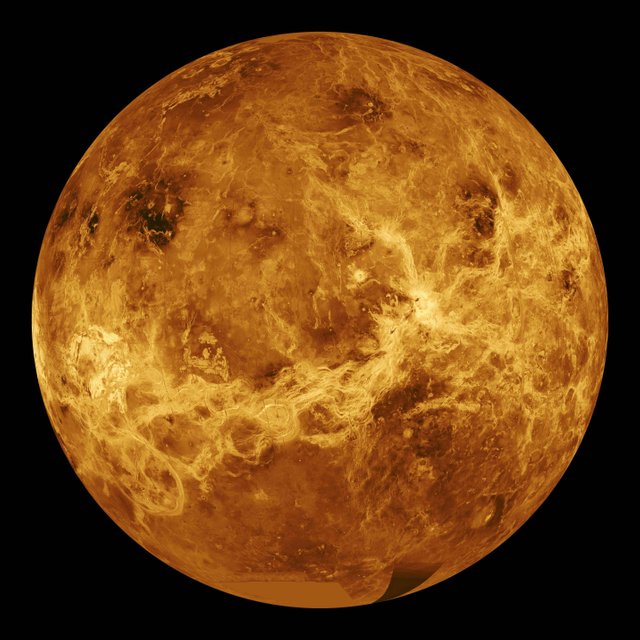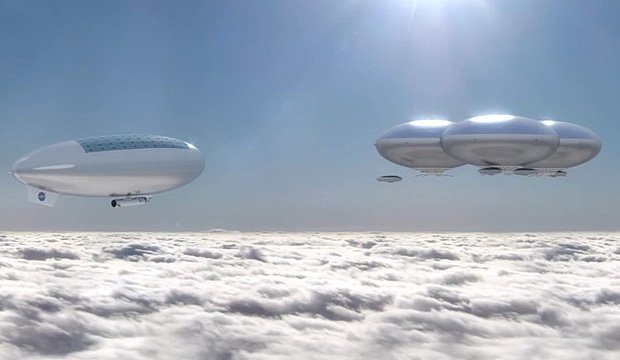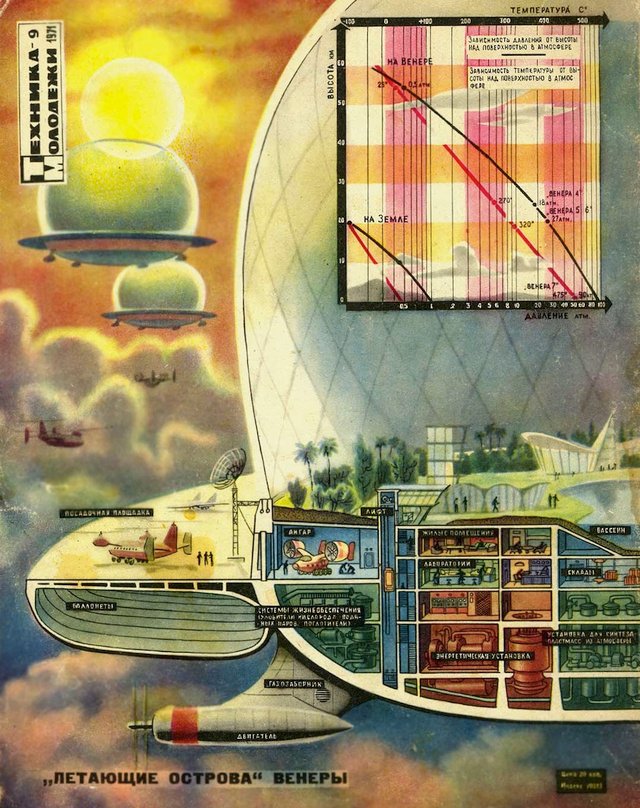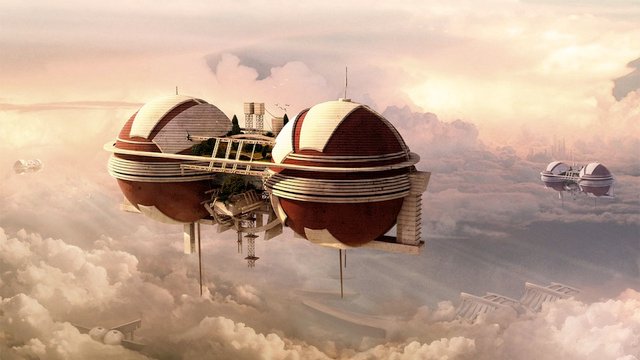Colonizing Venus: Only 90% as Crazy as it Sounds

Venus. A sweltering oven of a planet. At 870 degrees farenheit, lead will melt on the surface. The volcanism and thick, heat trapping atmosphere conspire to make it the hottest planet in the solar system...even hotter than Mercury. Religiously minded astronomers could be forgiven for believing they discovered hell, just one planet over all this time.

Yet it's possible to colonize. Not only possible, but one of the more promising targets for human settlement out of the planets within our reach. How can that be? How could a human population possibly survive, much less live comfortably, in such a miserable boiling hellscape?

In the sky, it turns out. At an altitude of 31 miles, the atmosphere of Venus is a remarkably Earthlike place. Temperatures vary vetween 32 and 122 degrees farenheit. The pressure is roughly that of Earth at sea level. The atmosphere protects from the radiation which endangers potential colonies on Mars or the Moon, and best of all, Oxygen is a lifting gas on Venus! The composition of the Venusian atmosphere is such that Oxygen is 60% as buoyant in it as Helium is on Earth.

This means that you could use the gas bag of your blimp or similar sky habitat as living space. Not some tiny gondola hanging beneath it, the entire interior volume would be available. NASA isn't even the first to think of this. Back in 1971, Soviet scientists were drawing up design reference studies for Venusian sky colonies with Earthlike landscapes within immense bubbles:

Because no pressure differential would exist between the inside and outside of the gas bag, leaks would not be immediately life threatening. Colonists could go outside wearing nothing more than regular clothing, a medical style oxygen mask and goggles (the atmosphere of Venus, even at that altitude, is mildly acidic and would irritate your eyes.)

So, what's the downside? There are many, actually. Sure it's possible to establish living space on Venus. But then what? You can generate power while in the sky using solar panels, but where do you get water? How do you obtain metals with which to construct new habitats? Venus is indeed a potential home for humanity, but not a self-sufficient one. It would be forever reliant on imports from Earth, or a colonized/terraformed Mars.
Don't let that stop you from fantasizing about Venusian sky cities, though. We have the technology to do it, and may conceivably have the need someday. As you know from this prior article of mine, sky cities on Earth are entirely feasible from an engineering standpoint. Perhaps it's just a question of waiting for the need to arise, or for a space elevator to slash the cost of human activities in space.
This is a very interesting concept that I have also studied and fantasized about. It blows my mind that the atmospheric pressure is so great down on the surface of Venus. The fact that it is a similar size to Earth yet the surface is so hot and has mind blowing pressure is crazy. The situation with raw materials is a huge issue. I feel like the dreams of colonizing Mars is going to be extremely tough as well. There are so many issues to overcome. I do think we should send some probes to Venus that would release solar drones to fly around in the atmosphere and take video and study it in more depth. Or perhaps the inflatable concept to fly around there and take readings. Cool post!
"Landing" habitats on Venus is actually easier because the gas bag can inflate on descent, gradually slowing the rate it's falling at until it stabilizes at the desired altitude. Mars has an atmosphere too thin for chutes, and gravity just high enough that propulsive landing is much harder than on the Moon for payloads any larger than the Curiosity rover. Hence that risky, untried inflatable aerobreak they've been working on.
That said, Mars has all of the mineral elements we need to continue modern high tech society. All of them. The Moon doesn't have that. Both have oxygen right in the soil. Both have water ice, though Mars has more. Mars has less surface radiation. But the variety of available metals is a big deal. If you simply can't get certain metals, the technologies that require them can't be built without importing that material.
With Mars I feel like everything is going to have to be underground and heavily protected from radiation and anyone there for extended amounts of time will have a hard time not turn out looking like a meth addict from being on the surface where the gravity is only 38% of Earth gravity. The entire time they fly to get to Mars they will have to be working out hard to slow down the muscle loss and effects. Then once they get there they will have to continue to workout hard. It is hard for me to imagine Mars every becoming a place where if life ended on Earth and we had a large Mars colony that they would ever be able to sustain themselves and live for generations and potentially get to the point of interstellar travel to leave the solar system utilizing materials mainly developed from Mars. I know that seems like a weird thing to think about but imagine we had a million people living and working on Mars and then something weird happened to Earth and everyone was vaporized. Then the Mars colony was all that was left and they had to figure out a way to progress and get off that rock. It is hard for me to imagine there would ever be enough to sustain them. I'm not going to lie Earth is pretty cool!
The other relative issue is gravity. Only Earth, Mars and Venus (in our solar system) have the gravity needed for healthy foetal gestation. We could put bases on the Moon but not reproduce there.
Thank you for that information. I didn't realize that. Gravity is such an interesting thing. That fact that you could be on an airship in the atmosphere and pretty much have the same gravity as here on Earth, but then if you were in orbit around Venus you would have 0 gravity. It is trippy for me to think about.
I read somewhere someone making a compelling case that some parts of our primitive biology function better in zero-G.
Gravity is such an oft overlooked factor about living on Mars. Glad to hear you bring it up! The gravity didn't seem to different for Matt Damon...
Awesome post. We're certainly going to need to get off this planet sooner rather than later. My only question is will intersteller travel be pheasable before we have the tech to colonize venus?
I think we could almost do Venus and Mars now with the right funding and push. The intersteller concepts are heating up as well and they are conceptually talking about placing lasers in the high desert in Chile that would focus on little mini space craft that we would then push at a considerable percentage of the speed of light to other star systems. It will still take decades and one of the main issues is the power requirements to transmit back to earth the findings. We will eventually figure it out. Unless we blow ourselves up first which is possible.
Mars settlement can be done a lot more cheaply than commonly assumed if colonists are willing to live underground.
Thanks for the link. I'm reading it as well and enjoying every word! I'm your 100th follower. After all my last name is Phobos
Science must be maintained in order to have a future
Can I reserve a condo now before this becomes a trend ? LOL great post really enjoyed this :)
very interesting, i never seen anything about this
Fantastic !! 😎
Venus, interesting. Like living in Cloud City on the planet Bespin.
An off topic question that I have. If the SUN's surface temperature is 6000 C, why can't we land on it? 6000C is not insurmountable.
It depends how you define "surface". The sun isn't a solid mass. You'd just be pulled further into it where temperatures are most certainly not surmountable.
VR technology coupled with drones could address most of the problems. You could potentially gather resources you needed from the surface of venus itself using drones that people in the habitats control via VR interfaces.
EDIT: I did think of a problem... sure you could do this on the surface. The problem is dealing with the escape velocity requirements and pressures and such to get the resources back up to the habitats. You could consider a space elevator type setup, but it turns out the cable requirements for that make that a tough thing to consider. Buckballs and carbon nano fibers are getting us closer to that possibly becoming a reality. Yet it is not as easy as it seems.
So VR and drones could only solve part of the problem..... hmmmm Oxygen as a lifting gas... could it get our drones to the habitat level?
Just not from earth as the delay would be nauseating! :-D
Unless we manage to figure out something cool with quantum entanglement. :)
That would work fine if we could build robots that didn't just melt after a few minutes. That's what happened to every Venus lander we've sent, they survived only long enough to send a few pictures.
Yeah. Sci-Fi approach would require a new material. Which there are some promising new materials. Whether they could be made to work or not... that's another story. (also I edited that reply you responded to... you may have missed some of my other comments)
Looks like Columbia (from BioShock Infinite) might be possible after all!
I wonder if future civilizations occupying a very different world would evolve over time to tolerate or even benefit from elemental differences in a new environment.
For example, given enough exposure and time, could humans maybe evolve a voluntarily controlled transparent inner eyelid that could shield the eye from irritants in the atmosphere? Or with technological advances could we bypass the need for evolution by modifying/up-grading humans with cybernetic implants to survive in harsh conditions?
Skyloft ftw. What a fun and exciting idea.